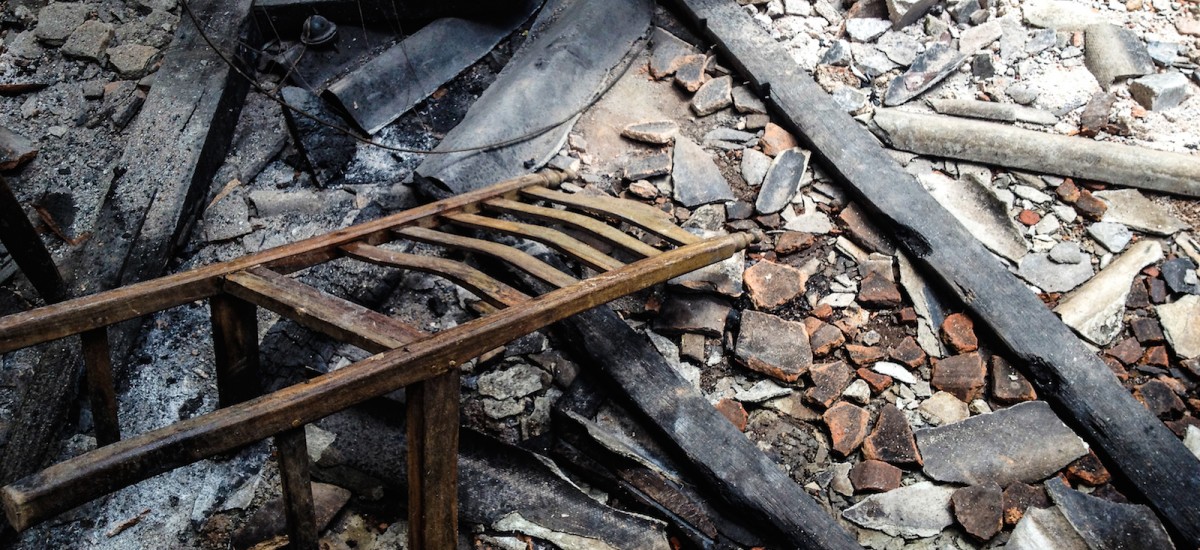Photo by Thyagi Ruwanpathirana
It is unlikely that there is anyone living who remembers the anti -Muslim riots of 1915. In any case, apart from the fact that most of the victims were Muslims and most of the perpetrators were Sinhalese, there are few similarities between the riots of 1915 and 2014. In1915 the British administration, in sharp contrast to our own today crushed the violence firmly and quickly. In fact the punishments they meted out were both needlessly cruel and indiscriminate. Many Sinhalese who were innocent of terrorism were summarily executed or incarcerated without due process.
In contrast, the parallels between the anti-Muslim riots of June 2014 and the anti-Tamil pogrom of July 1983 are uncanny. In both cases there were many Sinhalese families and individuals who incurred much cost and great risk in helping individuals and families attacked or under risk of attack to escape. Several institutions helped but few found it possible to openly confront the attacking mobs. The state, particularly the Police and other state institutions charged with maintaining law and order, did little to help or intervened too late. In fact the impression created is that important sections of the state were as complicit in the riots in Aluthgama and elsewhere in June 2014, as in the Island wide pogrom of July 1983. In both cases the leadership was primarily politically motivated but used ethnic and religious prejudices as well as economic opportunism to promote the violence
The leaders of our country keep protesting against “interference” in our internal affairs by foreign governments and International agencies. It is claimed that we are a sovereign people capable of resolving such problems satisfactorily on our own. But do our political leaders behave as though we are fit to exercise sovereign rights in a civilized manner? That many of the countries that preach to us of Human Rights also act in an uncivilized manner is no excuse. In particular several countries of the North have been guilty and in a few cases continue to be guilty of terrible Human Rights violations against citizens of countries of the South over the centuries. The wars in Vietnam and neighboring countries and even now in Iraq and Afghanistan and neighboring countries expose the hypocrisy of these countries. But does that excuse us?
One difference that stands out is that most of the victims of the governments of those countries of the North were not their own citizens, whereas in our case the victims are our own citizens. But from a Human Rights perspective this distinction is of little consequences. Unlike in the countries of the North, nearly every Sri Lankans claims to subscribe to one or the other of four great world religions, viz. Buddhism, Hinduism, Islam and Christianity. If we are true to our own professed religious affiliations, our country would be a model for the rest of the world. But, clearly, that is not the case. Are we a nation of hypocrites? Again and again violence is inflicted, often in the name of religion, with blatant impunity.
To the credit of the late Prime Minister Srimavo Bandaranaike, under her administration some senior service personnel guilty of “counter – terrorism” against JVP “terrorists” and their families were arrested, charged in the courts, found guilty and duly punished, in several cases with long imprisonment. That was unusual. Later, to the credit of President Chandrika Bandaranaike, she appointed a long overdue Presidential Commission of Inquiry into the pogrom of July 1983, and the report was published. The publication of the report was, again, unusual. In the latter case, none of the leading perpetrators, were arrested or charged or punished. Apart from these two exceptional cases, the general pattern over the last four decades has been either inaction by the State or deep complicity by sections of the State, and complete impunity to all the high ranking perpetrators.
Our pogroms and riots, and forced displacement of entire communities are two numerous for a complete listing. In most cases state agencies were involved directly or indirectly. Curiously even anti- state bodies, notably the LTTE, have enjoyed impunity during periods when the state sought to make a deal with them. A terrible instance was the cold blooded murder by the LTTE of nearly 600 Police personnel who had surrendered to the LTTE, presumably on the direction of the state. In this case most of the victims were Sinhalese, and some were Muslims, all of whom were on duty when they were captured and killed. The LTTE as well as several state sponsored Para-military groups committed many crimes against Sinhalese, Tamils and Muslim communities with complete impunity and very little of public protest.
It appears that a Panel of Inquiry (POI) is to be appointed to inquire into the causes and the remedies for the recent Aluthgama riots. Who will be members of the Panel? What will be the Terms of Reference (TOR)? Will the elected leaders of the Muslim community as well as the Leader of the Opposition in Parliament be consulted? Will the POI and TOR be such as to inspire confidence in the victims, of whom the overwhelming majority is Muslim? The statements and actions to date by the National Leaders are not encouraging. In fact they seem to be casting most of the blames on the Muslim victims and their leaders, just as President J.R.Jayawardene caste the blame for the 1983 pogrom on the Tamil victims and their leaders. Such statements and actions served to marginalize though moderate Tamil leaders, to build up the LTTE and to prepare the stage for a quarter century of civil war.
Next year will be the centenary of the first major ethnic riots in the history of the Island. We should deal differently with the Aluthgama and related riots, in such a manner that the people of the land will never again experience ethnic riots.

